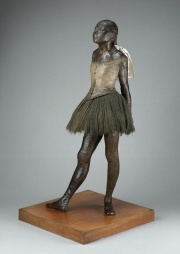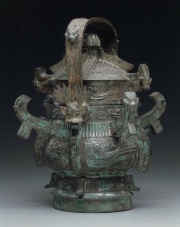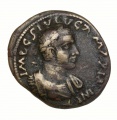Difference between revisions of "Bronze"
(username removed) |
|||
| Line 2: | Line 2: | ||
== Description == | == Description == | ||
| − | An alloy of [ | + | An alloy of [[copper]] and [[tin]] sometimes containing small amounts of [[zinc]], [[lead]], [[silver]], [[aluminum]], or [[phosphorus]]. Bronze artifacts have been discovered in Thailand dating from 3600 BCE, while Chinese and Middle Eastern bronzes have been dated as early as 2000 BCE. Bronze is stronger, harder, and more durable than [[brass]] or [[iron]]. It was used for weapons, tools, vases, household goods, coinage, jewelry, and cast sculptures. US standard bronze is composed of 90% copper, 7% tin and 3% zinc. Ancient bronze alloys sometimes contained up to 14% tin. Bronzes are usually a yellowish gold in color unless the copper concentrations are greater than 95% then they tend to be reddish. Bronzes with high tin concentrations (20-25%) are hard, brittle, and steel-colored. |
| − | See also [ | + | See also [[art bronze]], and [[gold bronze]]. |
[[File:34.66-E4792CR-d1.jpg|thumb|]] | [[File:34.66-E4792CR-d1.jpg|thumb|]] | ||
| + | |||
== Synonyms and Related Terms == | == Synonyms and Related Terms == | ||
Revision as of 11:26, 9 January 2014
Description
An alloy of Copper and Tin sometimes containing small amounts of Zinc, Lead, Silver, Aluminum, or Phosphorus. Bronze artifacts have been discovered in Thailand dating from 3600 BCE, while Chinese and Middle Eastern bronzes have been dated as early as 2000 BCE. Bronze is stronger, harder, and more durable than Brass or Iron. It was used for weapons, tools, vases, household goods, coinage, jewelry, and cast sculptures. US standard bronze is composed of 90% copper, 7% tin and 3% zinc. Ancient bronze alloys sometimes contained up to 14% tin. Bronzes are usually a yellowish gold in color unless the copper concentrations are greater than 95% then they tend to be reddish. Bronzes with high tin concentrations (20-25%) are hard, brittle, and steel-colored.
See also Art bronze, and Gold bronze.
Synonyms and Related Terms
lattin; maslin; tang (Chin.); brons (Ned., Sven.); bronze (Fr., Port.); Bronze (Deut.); bronzo (It.); bronce (Esp.)
Hazards and Safety
May contains small amounts of lead. Skin contact may cause allergic reactions in some people.
Additional Information
D.A.Scott, Copper and Bronze in Art: Corrosion, Colorants, Conservation, Getty Publications, Los Angeles, 2002.
Additional Images
Authority
- G.S.Brady, Materials Handbook, McGraw-Hill Book Co., New York, 1971 Comment: p. 120
- Ralph Mayer, A Dictionary of Art Terms and Techniques, Harper and Row Publishers, New York, 1969 (also 1945 printing)
- David C. Scott, Metallography and Microstructure of Ancient and Historic Metals, The Getty Conservation Institute, Los Angeles, 1991
- Jack Odgen, Jewellery of the Ancient World, Rizzoli International Publications Inc., New York City, 1982
- Dictionary of Building Preservation, Ward Bucher, ed., John Wiley & Sons, Inc., New York City, 1996
- Michael McCann, Artist Beware, Watson-Guptill Publications, New York City, 1979
- Random House, Webster's Encyclopedic Unabridged Dictionary of the English Language, Grammercy Book, New York, 1997
- The American Heritage Dictionary or Encarta, via Microsoft Bookshelf 98, Microsoft Corp., 1998
- Tom Rowland, Noel Riley, A-Z Guide to Cleaning, Conserving and Repairing Antiques, Constable and Co., Ltd., London, 1981
- George Savage, Art and Antique Restorer's Handbook, Rockliff Publishing Corp, London, 1954
- Wikipedia, the free encyclopedia, at http://www.wikipedia.com Comment: Bronze


